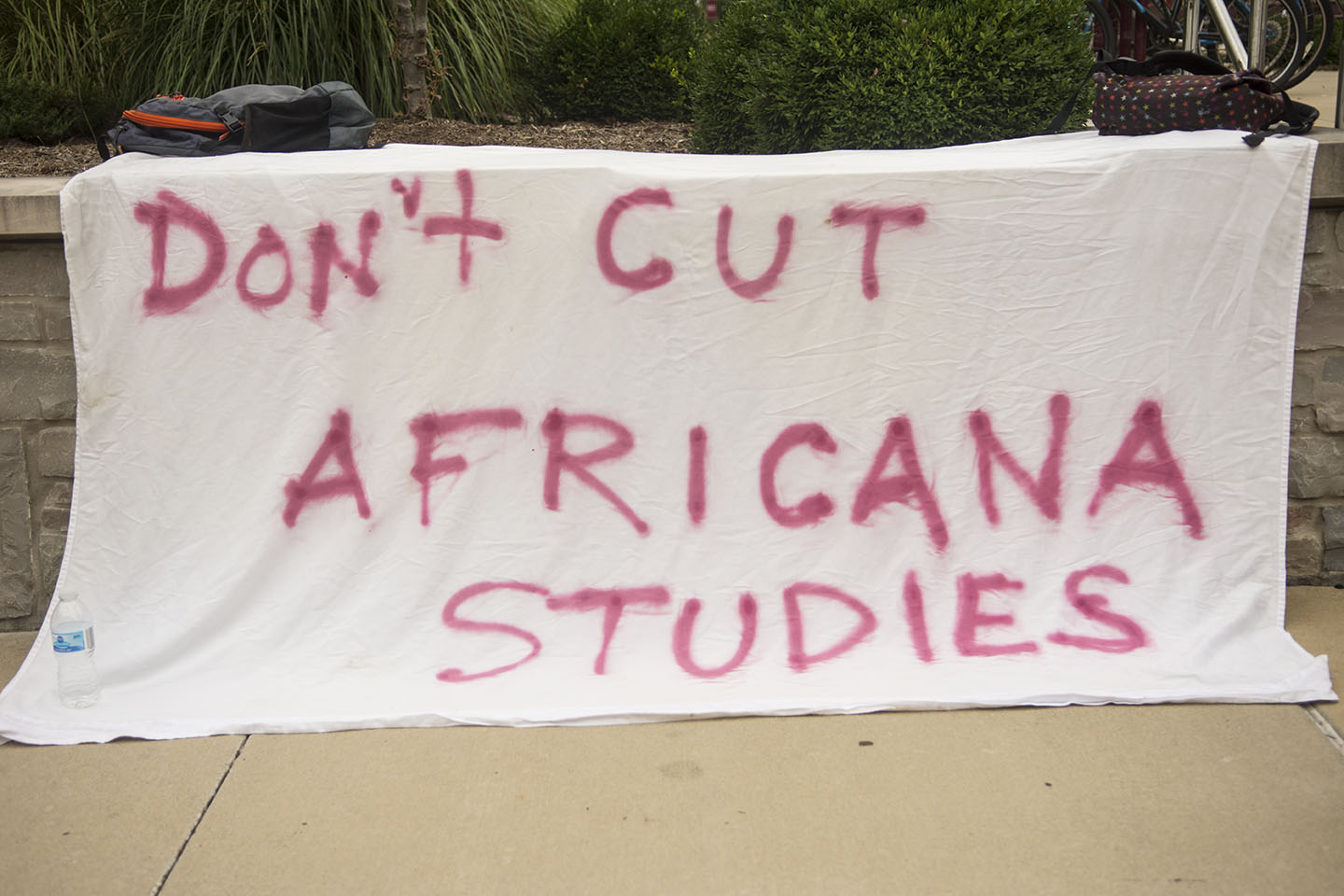Members of Africana studies department say they are the model of collaboration the chancellor wants
A banner stating “don’t cut Africana Studies” sits outside the Student Center Tuesday, Aug. 22, 2017. Students and alumni gathered outside the Student Center to protest the removal of the Africana Studies program from SIU. Athena Chrysanthou | @Chrysant1Athena)
November 16, 2017
Members of the Africana studies department say it models the interdisciplinary synergy that Chancellor Carlo Montemagno wants his reorganization plan to promote, and therefore the major shouldn’t be eliminated.
“We’ve always been working together,” Joseph Brown, a professor in the department, said.
The department has 12 affiliated faculty members and three core faculty members, professor Leonard Gadzekpo said.
Advertisement
They span across the School of Art and Design, the history department, the English department, the School of Music, and the departments of anthropology, theater, sociology, philosophy and radio, television and digital media, Gadzekpo said.
In a faculty meeting Monday, six Africana studies faculty members were present. Brown said they talked about “surviving in a world that doesn’t want us.”
This has been a recurring theme for the department since almost 1997, Brown said.
The Financial Sustainability Plan, which was approved by the Board of Trustees in July, put Africana studies, along with six other programs, on the chopping block for elimination. In October, Montemagno said he would defer his decision on the department’s fate for a year.
In the chancellor’s State of the University speech in October, he said his plan to reorganize SIU’s academic units would provide the chance for programs to experience interdisciplinary collaboration. The original proposal got rid of Africana studies as a major, but kept it as a minor.
Brown said he thinks the chancellor hasn’t been given accurate information upon which to base his decisions, and he finds it problematic that Montemagno didn’t fact check certain figures — such as the department’s enrollment and history of collaboration — before drafting his plans.
“Twenty years ago, this department was as interdisciplinary as you can make it, and we have always been a touchstone and a symbol of how that multicultural disciplinarity works,” Brown said. “But the chancellor does not know that and the university does not respect it. Nevertheless, this is the fact of what he thinks should be the future.”
Advertisement*
If the Africana studies department was given more resources and faculty members, it could again be a model of synergy, Brown said.
“That’s how we learn, and that’s how we are supposed to teach,” Brown said.
Ras Michael Brown, a professor with a joint appointment in the history and Africana studies departments, said cross-listed classes — like the ones common in Africana studies — are vital for the type of synergy the chancellor says he wants.
“We have the same students going back and forth between these programs who are doing so through Africana studies,” Ras Michael Brown said. “They have multiple aspirations, and they say Africana studies is the vehicle that allows them to do all these things.”
Joseph Brown said cross-listed courses aren’t pushed enough by advisors. Advisors, he said, should give students encouragement to diversify the classes they take.
“To be a fully realized human being, or as fully realized as possible, you have to know a bunch of different things,” he said. “And in order to fit in this global world, you need to have a really broadly-trained mind and heart in order to be successful.”
Gadzekpo, also the interim chair of the department, said a common misconception about Africana studies courses is that they are only about race.
“We talk about individuals, we talk about families and we talk about communities,” Gadzekpo said. “We talk about intersectionality.”
Gadzekpo said the department covers political, economical and social aspects of today’s global society. He said because there are African descendants living globally, the department’s curriculum includes all the diverse places in which African and African-descended people live.
Robert Fox, an English professor affiliated with the Africana studies department said minority studies like Africana studies teach students important history they might not otherwise learn.
“All minority studies…they’re all illuminating with regard to the reality of the United States and its history,” Fox said. “It’s all hidden history.”
Another example Gadzekpo gave of interdisciplinary collaboration was an instance where faculty members from anthropology, communications and Africana studies came together to start an Africana film series on campus.
Joseph Brown said faculty in various departments work together in other scenarios too, and referenced his participation in numerous graduate research committees for master’s and doctoral work in psychology, philosophy, higher education administration, public health, anthropology, economics, english, sociology and history.
He said it’s important to have committee members from various departments who can ask intelligent questions from a cross-cultural perspective when a graduate student presents research.
Africana studies prepares students for the diverse lives they will have to live in United States and in the rest of the world, Gadzekpo said.
“People don’t live their lives in compartments,” he said.
Staff writer Amelia Blakely can be reached at [email protected] or on Twitter @AmeilaBlakely.
To stay up to date with all your southern Illinois news, follow the Daily Egyptian on Facebook and Twitter.
Advertisement









